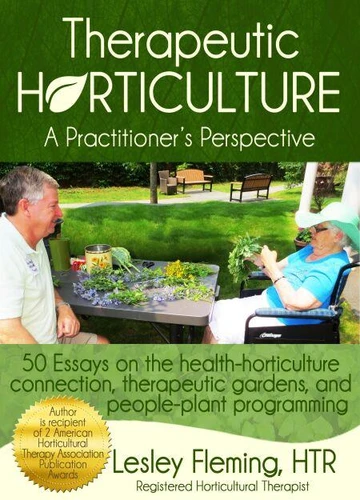Therapeutic Horticulture A Practitioner's Perspective
Par :Formats :
Disponible dans votre compte client Decitre ou Furet du Nord dès validation de votre commande. Le format ePub est :
- Compatible avec une lecture sur My Vivlio (smartphone, tablette, ordinateur)
- Compatible avec une lecture sur liseuses Vivlio
- Pour les liseuses autres que Vivlio, vous devez utiliser le logiciel Adobe Digital Edition. Non compatible avec la lecture sur les liseuses Kindle, Remarkable et Sony
 , qui est-ce ?
, qui est-ce ?Notre partenaire de plateforme de lecture numérique où vous retrouverez l'ensemble de vos ebooks gratuitement
Pour en savoir plus sur nos ebooks, consultez notre aide en ligne ici
- FormatePub
- ISBN978-1-370-33760-6
- EAN9781370337606
- Date de parution06/08/2016
- Protection num.pas de protection
- Infos supplémentairesepub
- ÉditeurEditeurs divers USA
Résumé
Insights into therapeutic horticulture, a health profession that uses plant and plant-related activities to improve people's lives through passive or active involvement are presented in a collection of 50 essays. Programs for dementia, autism, eating disorder and other populations shed light on positive health outcomes, as does research, therapeutic gardens, tools, plants and treatment plans. In the hands of trained practitioners, therapeutic horticulture can transform lives.
Susan, with cognitive impairment feels smart while sharing plant information. Roy, a non-verbal 16 year old student on the autism disorder spectrum, interacts cooperatively with his school peers by passing them potting materials. Pam discusses her grief, her fear of dying and the cycle of life while working with a horticultural therapist transplanting new bromeliad pups. Truly inspiring, this nature-based programming with its science-based foundation is a powerful health modality that improves people's lives and well-being.
Susan, with cognitive impairment feels smart while sharing plant information. Roy, a non-verbal 16 year old student on the autism disorder spectrum, interacts cooperatively with his school peers by passing them potting materials. Pam discusses her grief, her fear of dying and the cycle of life while working with a horticultural therapist transplanting new bromeliad pups. Truly inspiring, this nature-based programming with its science-based foundation is a powerful health modality that improves people's lives and well-being.
Insights into therapeutic horticulture, a health profession that uses plant and plant-related activities to improve people's lives through passive or active involvement are presented in a collection of 50 essays. Programs for dementia, autism, eating disorder and other populations shed light on positive health outcomes, as does research, therapeutic gardens, tools, plants and treatment plans. In the hands of trained practitioners, therapeutic horticulture can transform lives.
Susan, with cognitive impairment feels smart while sharing plant information. Roy, a non-verbal 16 year old student on the autism disorder spectrum, interacts cooperatively with his school peers by passing them potting materials. Pam discusses her grief, her fear of dying and the cycle of life while working with a horticultural therapist transplanting new bromeliad pups. Truly inspiring, this nature-based programming with its science-based foundation is a powerful health modality that improves people's lives and well-being.
Susan, with cognitive impairment feels smart while sharing plant information. Roy, a non-verbal 16 year old student on the autism disorder spectrum, interacts cooperatively with his school peers by passing them potting materials. Pam discusses her grief, her fear of dying and the cycle of life while working with a horticultural therapist transplanting new bromeliad pups. Truly inspiring, this nature-based programming with its science-based foundation is a powerful health modality that improves people's lives and well-being.



